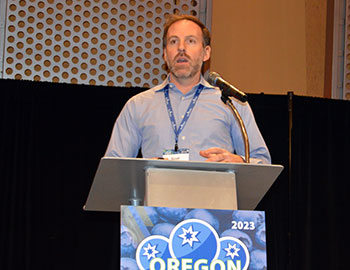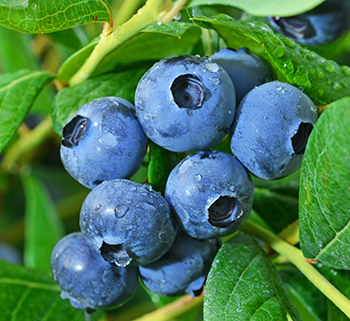Looking ahead in OSU’s NW Berry Program
By Scott Lukas, Endowed Professor for Northwest Berry Production and Management, OSU
Oregon State University has a long history providing berry crops research and Extension support to small fruit industries. The Northwest (NW) Berry Program has played an instrumental role in providing small fruits research over the last 36 years, where Dr. Bernadine Strik led an impactful program at a regional, national and international level. Dr. Strik retired in 2021, leaving the NW Berry Program in the highly capable hands of Research Assistants Amanda Davis and Patrick Jones while a competitive search for Strik’s successor took place. In September 2022, I was selected to lead the program into the future with the help of Amanda and Patrick.
 |
Speaking at the Oregon Blueberry Conference, Scott Lukas, who was named Endowed Professor for Northwest Berry Production and Management at OSU last September, unveiled some of his research visions for the program. |
I join the program from my previous position at OSU’s Hermiston Agricultural Research and Extension Center where I developed a horticulture program focusing on high-value irrigated cropping systems, such as blueberry. With training in plant physiology, I bring a range of experiences to optimize production with reduced inputs. Some of my past projects include research into water and fertilizer use efficiency, sensing and automation of systems, nitrogen fate and transport and soil characteristics and plant interactions.
My new position has a three-way split of responsibilities for research, Extension and teaching. On the research and extension side, I am the berry research leader for OSU and the lead collaborator for the USDA/OSU cooperative breeding programs. My teaching responsibilities cover three courses: 1) Taxonomy of tree fruit, berry, grapes and nuts; 2) Berry and grape physiology and culture; and 3) Physiology and production of berry crops.
Looking towards the future, my initial steps are to listen and learn about regional cropping systems to develop a greater understanding of current practices, successes, challenges and needs. I plan to proceed strategically to develop research in alignment with needs to deliver practical and usable results, with overarching goals to provide science-based support tools to foster productivity, quality and resiliency of small fruits systems. To achieve this from a wide-angle perspective, I will emphasize the importance of multi-disciplinary cooperations with specialists spanning marketing, economics, social sciences and more. In addition, I hope to expand programming with technological advancements that keep the small fruits industry on the leading edge.
From a targeted perspective, my research vision highlights four pillars of resilience: productivity, quality, efficiency and marketability. For productivity and quality, themes of soil and plant interactions, fertility and bio-stimulant management, canopy management and data driven support tools emerge. For efficiency, I will highlight the need to expand on the labor-saving practices of mechanization of harvest, pruning and sorting by leveraging industry cooperation with developing technology firms. In addition, workforce training opportunities for crop management and quality control of harvest operations are needed to maintain a competitive edge in mechanization. In regard to marketability, I believe it is important that the industry can move towards machine harvesting for high quality fresh market.
 |
Focusing on the USDA/OSU cooperative breeding program, I am hoping to solicit industry feedback in the breeding selection process through developing a blueberry crop advisory committee. One goal of this leg of the program is to pipeline promising selections to growers’ fields to be sure advanced selections perform well in ‘real-world’ management systems. Having grower feedback coupled with USDA and OSU research station plant performance data will help ensure plant releases are in-line with the needs of the industry and that they perform across management systems.
From a structural program perspective, I will be working with current staff, as well as working to increase staff to keep up with program and industry growth. The need to update program infrastructure to demonstrate new tools and technology for producers is important as we move forward.
Communication is another prominent aspect of my vision for the program as I work to base the program on trust, integrity and productivity. To do so, fostering effective communication is necessary between researchers, extension agents and stakeholders so that we are all learning from one another as equals.
There has been significant transition in Oregon’s small fruit research and Extension faculty and in farm management, with new people at the helm, do we need to re-scope to ensure we are all communicating efficiently and effectively so that OSU is providing the industry with the best resources and opportunities to support continued success? What engagement methods work for you? Is the current timing of berry field days optimal for you? Would you like to see winter workshops, social media updates? These are questions I will be asking in hopes of receiving feedback so we can aim to optimize delivery of information.
Lastly, as I settle into my new position as the Northwest Berry Production and Management Professor for OSU, I want to stress the desire to have open lines of communication with stakeholders. I hope to build relationships where we can usually call one another, not just for major issues, but to stay in touch. Please send me an email so I can start to develop these relationships and visit your operation.
You can reach me at Scott.Lukas@oregonstate.edu.